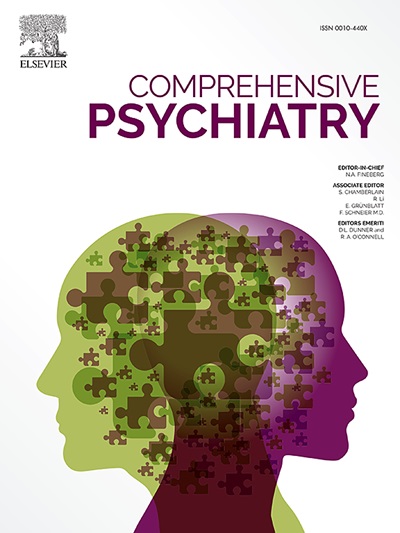个性、动机和游戏障碍症状:一项针对电子竞技玩家、高参与度玩家和休闲玩家的大规模比较研究。
IF 4.2
2区 医学
Q1 PSYCHIATRY
引用次数: 0
摘要
电子竞技(即竞争性电子游戏)是一种不断发展的活动,但与有问题的消费相关的各种风险或危害。本研究的目的是调查电子竞技与不同问题消费指标的关联程度,以及玩电子游戏的动机如何反映电子竞技玩家、休闲玩家和高参与度玩家之间的差异。方法收集14727名游戏玩家(平均年龄24.1岁[SD = 7.0])的人格、精神病理症状和游戏行为自述数据;89.3%为男性),包括557名电子竞技选手(平均年龄= 21.5岁[SD = 6.5];95.9%为男性),5101名休闲运动员(平均年龄26.1岁[SD = 7.5];87.8%为男性),9069名高粘性玩家(平均年龄23.2岁[SD = 6.4];89.7%为男性)。结果比较这三组,电竞玩家更可能是男性,年龄更年轻,更有可能具有好胜的个性。在游戏动机方面,与高度投入的玩家相比,电子竞技玩家表现出较低的精通、刺激和逃避动机。与其他两组相比,高度投入的玩家表现出更高的感觉追求、更高的消极情感和更低的社交能力。结论电子竞技玩家往往具有平衡的心理特征,这表明电子竞技本身并不一定与问题使用特征相关。高参与度的玩家表现出潜在的有害特征,比如更高的压力和抑郁感,以及玩游戏的动机(逃避现实)。我们鼓励采取干预措施来保护和支持这一玩家群体。本文章由计算机程序翻译,如有差异,请以英文原文为准。
Personality, motivations, and gaming disorder symptoms: A large-scale comparative study of esports players, highly engaged gamers, and recreational players.
Background and aims
Esports playing (i.e., competitive videogaming) is an ever-growing activity but has a variety of risks or harms associated with problematic consumption. The aim of the present study was to investigate the extent to which esports is associated with different indicators of problematic consumption and how motivations for playing videogames reflect differences between esports players, recreational players, and highly engaged gamers.
Methods
Self-report data were collected regarding personality, psychopathological symptoms, and gaming behavior among 14,727 gamers (mean age = 24.1 years [SD = 7.0]; 89.3 % male) comprising 557 esports players (mean age = 21.5 years [SD = 6.5]; 95.9 % male), 5101 recreational players (mean age = 26.1 years [SD = 7.5]; 87.8 % male), and 9069 highly engaged gamers (mean age = 23.2 years [SD = 6.4]; 89.7 % male).
Results
Comparing all three groups, esports players were more likely to be male, younger in age, and were more likely to have a competitive personality. When compared to highly engaged gamers with regard to gaming motivation, esports players showed lower mastery, stimulation, and escapism motives. Highly engaged gamers displayed higher sensation seeking, higher negative affectivity, and lower sociability compared to the other two groups.
Conclusion
Esports players tend to have a balanced psychological profile, which indicates that esports themselves are not necessarily associated with problematic use characteristics. Highly engaged gamers showed potentially harmful characteristics in terms of higher perceived stress and depression, and motivations to play (escapism). Interventions are encouraged to protect and support this group of gamers.
求助全文
通过发布文献求助,成功后即可免费获取论文全文。
去求助
来源期刊

Comprehensive psychiatry
医学-精神病学
CiteScore
12.50
自引率
1.40%
发文量
64
审稿时长
29 days
期刊介绍:
"Comprehensive Psychiatry" is an open access, peer-reviewed journal dedicated to the field of psychiatry and mental health. Its primary mission is to share the latest advancements in knowledge to enhance patient care and deepen the understanding of mental illnesses. The journal is supported by a diverse team of international editors and peer reviewers, ensuring the publication of high-quality research with a strong focus on clinical relevance and the implications for psychopathology.
"Comprehensive Psychiatry" encourages authors to present their research in an accessible manner, facilitating engagement with clinicians, policymakers, and the broader public. By embracing an open access policy, the journal aims to maximize the global impact of its content, making it readily available to a wide audience and fostering scientific collaboration and public awareness beyond the traditional academic community. This approach is designed to promote a more inclusive and informed dialogue on mental health, contributing to the overall progress in the field.
 求助内容:
求助内容: 应助结果提醒方式:
应助结果提醒方式:


